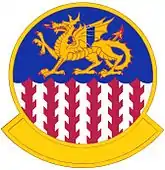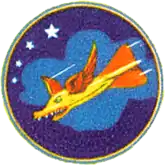337th Test and Evaluation Squadron
The 337th Test and Evaluations Squadron is a squadron of the United States Air Force. It is a part of the 53d Test and Evaluation Group of the 53d Wing. Its primary task is to test and evaluate modifications on the B-1 bomber, as well as to train future aircrews to fly upgraded B-1s.[3] The 337th is headquartered at Dyess AFB, Texas, though it operates out of a number of bases throughout the United States.[4]
337th Test and Evaluation Squadron
 | |
|---|---|
.jpg.webp) Upgraded B-1 Lancer undergoing operational testing by the squadron | |
| Active | 1942–1945; 1947–1949; 1953–1963; 1963–1994; 2004–present |
| Country | |
| Branch | |
| Role | Operational Testing |
| Part of | Air Combat Command |
| Garrison/HQ | Dyess Air Force Base, Texas |
| Engagements | European Theater of Operations |
| Decorations | Distinguished Unit Citation Air Force Outstanding Unit Award[1] |
| Insignia | |
| 337th Test and Evaluation Squadron emblem (approved 29 August 1967)[1] |  |
| 337th Bombardment Group emblem (approved 5 May 1943)[2] |  |
| Aircraft flown | |
| Bomber | Rockwell B-1 Lancer |
History
World War II
From 14 May 1943 to 21 April 1945, the squadron conducted strategic bombardment of shipyards, submarine bases, marshaling yards, oil facilities, airfields, and aircraft plants. On occasion, it flew tactical sorties against gun emplacements, rocket sites, enemy troops, and communications centers.[1]
On 17 August 1943, it earned its first Distinguished Unit Citation, striking targets at Regensburg and Schweinfurt, Germany. Soon after, on 14 October 1943, the squadron participated in World War II's single most important raid on ball-bearing factories at Schweinfurt.[1]
On 9 April 1944, it earned a second DUC in an attack on aircraft component factories at Poznań, Poland. The squadron subsequently attacked enemy field batteries and miscellaneous targets in support of Normandy operations on 6 June 1944.[1]
Strategic Air Command
Beginning in 1968, Boeing B-52 Stratofortress aircraft and crews deployed to Southeast Asia (SEA) for bombardment operations. For much of the conflict, the squadron furnished aircraft and crews to Strategic Air Command organizations based in SEA.[1] When the Air Force switched to the B-1 Lancer, the 337th was the first unit to fly the new bomber.
Test and evaluation
As part of the 53d Test and Evaluation Group, the 337th conducts testing of various upgrades to the B-1, as well as trains aircrews to operate and maintain the upgraded aircraft. The squadron has been currently working on the increasing the B-1's weapons payload, attempting to increase the bomber's ability to deliver weapons into heavily defended areas.[3]
Lineage
- Constituted as the 337th Bombardment Squadron (Heavy) on 28 January 1942
- Activated on 15 July 1942
- Redesignated 337th Bombardment Squadron, Heavy on 22 June 1943
- Inactivated on 29 November 1945
- Redesignated 337th Bombardment Squadron, Very Heavy on 13 May 1947
- Activated in the reserve on 29 May 1947.
- Inactivated 27 June 1949.
- Redesignated 337th Bombardment Squadron, Medium on 6 November 1953
- Activated 18 November 1953
- Discontinued and inactivated on 15 March 1963
- Redesignated 337th Bombardment Squadron, Heavy
- Activated on 20 March 1963 (not organized)
- Organized on 15 September 1963
- Redesignated 337th Bomb Squadron on 1 September 1991
- Inactivated on 1 October 1994
- Redesignated 337th Test and Evaluation Squadron on 8 April 2004
- Activated on 14 May 2004[1]
Assignments
- 96th Bombardment Group, 15 July 1942 – 29 November 1945
- 96th Bombardment Group, 29 May 1947 – 27 June 1949
- 96th Bombardment Wing (later 96 Strategic Aerospace Wing), 18 November 1953 – 15 Mar 1963
- Strategic Air Command, 20 Mar 1963 (not organized)
- 96th Strategic Aerospace Wing (later 96 Bombardment Wing), 15 September 1963
- 96th Operations Group, 1 September 1991
- 7th Operations Group, 1 October 1993 – 1 October 1994
- 53d Test and Evaluation Group, 14 May 2004 – present[1]
Stations
- Salt Lake City Army Air Base, Utah, 15 July 1942
- Gowen Field, Idaho, 6 August 1942
- Walla Walla Army Air Base, Washington, 31 August 1942
- Rapid City Army Air Base, South Dakota, 29 September 1942
- Pocatello Army Air Field, Idaho, 3 November 1942
- Pyote Army Air Base, Texas, 7 January - 15 April 1943
- RAF Andrews Field (AAF-485), England, 13 May 1943
- RAF Snetterton Heath (AAF-138), England, 29 May 1943 - 22 November 1945
- Camp Kilmer, New Jersey, 27–29 November 1945
- Gunter Field (later Gunter Air Force Base), Alabama, 29 May 1947 - 27 June 1949
- Altus Air Force Base, Oklahoma, 18 November 1953
- Dyess Air Force Base, Texas, 8 September 1957 - 15 March 1963
- Dyess Air Force Base, Texas, 15 September 1963 - 1 October 1994
- Dyess Air Force Base, Texas, 14 May 2004 – present[1]
Aircraft
- Boeing B-17 Flying Fortress (1942-1945)
- North American AT-6 Texan (1947-1949)
- Beechcraft AT-11 Kansan (1947-1949)
- Boeing B-47 Stratojet (1955-1963)
- Boeing B-52 Stratofortress (1963-1970, 1970-1972, 1973-1985)
- Rockwell B-1 Lancer (1986-1994, 2004–present)[1]
Decorations
- Distinguished Unit Citations
- Germany, 17 August 1943
- Poznań, Poland, 9 April 1944
- Air Force Outstanding Unit Awards
- 1 January 1959 - 31 December 1960
- 1 July 1974 - 30 June 1975
- 1 July 1978 - 30 June 1979
- 1 July 1988 - 30 June 1990
- 1 July 1990 - 29 May 1992
- 1 June 1992 - 30 May 1994
References
- Notes
- Marion, Forrest L. (December 10, 2007). "Factsheet 337 Test and Evaluation Squadron (ACC)". Air Force Historical Research Agency. Retrieved December 6, 2016.
- Maurer, Combat Squadrons, pp. 416-417
- "Unit: 337th Test and Evaluation Squadron". USAFEngineers.com. Archived from the original on 5 March 2012. Retrieved 3 November 2007. (access restricted)
- "History of the 53rd Wing". 96 Test Wing Public Affairs. January 2, 2008. Archived from the original on August 30, 2009. Retrieved December 6, 2016.
Bibliography
![]() This article incorporates public domain material from the Air Force Historical Research Agency website http://www.afhra.af.mil/.
This article incorporates public domain material from the Air Force Historical Research Agency website http://www.afhra.af.mil/.
- Maurer, Maurer, ed. (1983) [1961]. Air Force Combat Units of World War II (PDF) (reprint ed.). Washington, DC: Office of Air Force History. ISBN 0-912799-02-1. LCCN 61060979.
- Maurer, Maurer, ed. (1982) [1969]. Combat Squadrons of the Air Force, World War II (PDF) (reprint ed.). Washington, DC: Office of Air Force History. ISBN 0-405-12194-6. LCCN 70605402. OCLC 72556.
- Ravenstein, Charles A. (1984). Air Force Combat Wings, Lineage & Honors Histories 1947-1977. Washington, DC: Office of Air Force History. ISBN 0-912799-12-9.